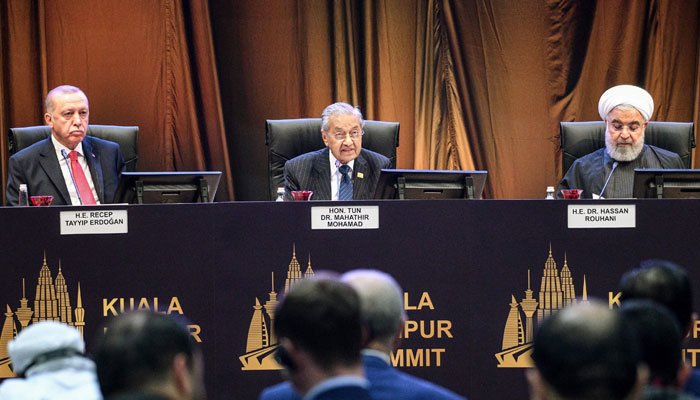Malaysia, Turkey, Iran, Qatar coin new plan: Gold, barter to beat future US sanctions
The leaders agreed they needed to do more business among themselves and trade in each other’s currencies.
KUALA LUMPUR/ISLAMABAD: Iran, Malaysia, Turkey and Qatar are considering trading among themselves in gold and through a barter system as a hedge against any future economic sanctions on them, Malaysian Prime Minister Mahathir Mohamad announced on Saturday.
At the conclusion of the Islamic summit in Malaysia, Mahathir praised Iran and Qatar for withstanding economic embargoes and said it was important for the Muslim world to be self-reliant to face future threats, reported a UK-based international wire agency. “With the world witnessing nations making unilateral decisions to impose such punitive measures, Malaysia and other nations must always bear in mind that it can be imposed against any of us,” Mahathir said.
Saudi Arabia, the United Arab Emirates, Bahrain and Egypt had severed diplomatic and trade links with Qatar about 2-1/2-years ago over allegations that it backed terrorism, a charge Doha denied. Iran, meanwhile, has been hit badly after the United States reimposed sanctions on it last year. “I have suggested that we re-visit the idea of trading using the gold dinar and barter trade among us,” Mahathir said, referring to the Islamic medieval gold coin. “We are seriously looking into this and we hope that we will be able to find a mechanism to put it into effect.”
The leaders agreed they needed to do more business among themselves and trade in each other’s currencies. By the fourth and final day of the summit, no joint statement was released. The summit was expected to discuss major issues affecting the Muslims. Without naming any country, Mahathir said there was concern that Muslims in non-Muslim countries were forced to undergo assimilation. “We support integration but assimilation to the extent of shedding our religion is unacceptable,” he said. At a news conference, he called India’s new citizenship act unfortunate.
Meanwhile, a war of words has started between Turkey and Saudi Arabia — the two member states of the Organization of Islamic Cooperation (OIC) — following Pakistan’s non participation in the Malaysia-sponsored Islamic Summit in Kuala Lumpur. The war [of words] started after the Turkish President Recep Tayyip Erdogan told the Turkish media that Saudi Arabia had threatened Pakistan with sending back over 4 million Pakistan working there and re-employing Bangladeshi people besides withdrawing money deposited in the State Bank of Pakistan if it attended the Kuala Lumpur summit. He said Pakistan had to obey the Saudi demands because of its economic difficulties, and implied that Indonesia also suffered from similar problems.
Erdogan's statement embarrassed Pakistan and its Foreign Office without naming Turkey in a late Friday night statement said, “Pakistan did not participate in the KL Summit, as time and efforts were needed to address the concerns of major Muslim countries regarding possible division in the Ummah. Pakistan will continue to work for unity and solidarity of the Ummah, which is indispensable for effectively facing the challenges faced by the Muslim world”. Islamabad’s public position about not attending the summit just before it started was that Saudi Arabia and the UAE had concerns about the summit, as these two countries were worried that the event could cause “division in Ummah” and lead to setting up of an organisation parallel to the existing Saudi-dominated OIC. “In view of reservations about the summit, it was decided that Pakistan would seek to bridge the gap between Riyadh and Kuala Lumpur and if that did not work, there would be no participation in the summit,” said Foreign Minister Shah Mehmood Qureshi.
On Saturday, it was Saudi Arabia’s turn to give a strong response to Turkey (without naming it). Saudi Arabia rejected giving any threats to Pakistan and denied it had asked it to skip the summit, while reaffirming its commitment to always stand with Pakistan for it to be a successful and stable country. “The Royal Embassy of Saudi Arabia in Pakistan affirms that relations between the Kingdom of Saudi Arabia and Islamic Republic of Pakistan are superior to the language of threat,” said a statement released by the embassy. It said the news about the reason for Pakistan not attending was fake, as the Kingdom had neither pressurised nor threatened Pakistan from attending the summit.
“The brotherly relations between the countries are long-standing and strategic based on trust, understanding and mutual respect, and the two countries enjoy a consensus of views on most regional and international issues, especially the issues of the Islamic nation.” It added, “The embassy also confirms that the Kingdom has always stood with Pakistan in difficult times based on fraternal relations, and we strive always to stand with Pakistan to be a successful and stable country.”
Saudi Arabia also appreciated the ‘brotherly’ relations with Pakistan and said both countries agreed on the importance of unity of the Islamic nation, maintaining the role of the Organisation of Islamic Cooperation (OIC), mutual respect for their sovereignty and the independence of their decisions, which is a key feature of the well-established historical relations between them.
Earlier, the Saudi-based OIC, where Pakistan now has a permanent representative, said it was against the interests of the Muslim world to hold meetings outside the organisation, which has for decades acted as the collective Islamic voice.
-
 UK Asylum System Faces Changes As Refugees Will Get Temporary Protection Only
UK Asylum System Faces Changes As Refugees Will Get Temporary Protection Only -
 Meghan Markle Has Realised ‘star Power’ Is Not Enough After Jordan Trip
Meghan Markle Has Realised ‘star Power’ Is Not Enough After Jordan Trip -
 USC Leading Scorer Chad Baker-Mazara Leaves Program Amid Losing Streak
USC Leading Scorer Chad Baker-Mazara Leaves Program Amid Losing Streak -
 Google Is Winding Down Popular App 'Pixel Studio': Here's Why
Google Is Winding Down Popular App 'Pixel Studio': Here's Why -
 Zendaya, Tom Holland Secretly Married?
Zendaya, Tom Holland Secretly Married? -
 Dove Cameron Reveals Why She's Limiting Relationship Talk After Damiano David Engagement
Dove Cameron Reveals Why She's Limiting Relationship Talk After Damiano David Engagement -
 Bulls Vs Bucks: Giannis Out, Simons And Williams Sidelined
Bulls Vs Bucks: Giannis Out, Simons And Williams Sidelined -
 Princess Beatrice Is ‘haunted’ By Dreadful Shamed Andrew Arrest
Princess Beatrice Is ‘haunted’ By Dreadful Shamed Andrew Arrest -
 Panthers Vs Islanders: Dmitry Kulikov Returns From Injured Reserve As Schwindt Hits IR
Panthers Vs Islanders: Dmitry Kulikov Returns From Injured Reserve As Schwindt Hits IR -
 SAG-AFTRA Drops SAG Awards Name To Rebrand
SAG-AFTRA Drops SAG Awards Name To Rebrand -
 Next Full Moon: How To Watch The Total Lunar Eclipse On March 3
Next Full Moon: How To Watch The Total Lunar Eclipse On March 3 -
 Bhad Bhabie Shares Tender Moment With Daughter Amid Cancer Setback Hint
Bhad Bhabie Shares Tender Moment With Daughter Amid Cancer Setback Hint -
 Silver, Gold Prices Surge Amid Geopolitical Uncertainty After US-Israel Attack On Iran
Silver, Gold Prices Surge Amid Geopolitical Uncertainty After US-Israel Attack On Iran -
 Britain To Trial Social Media Ban For Hundreds Of Thousands Of Children Under-16
Britain To Trial Social Media Ban For Hundreds Of Thousands Of Children Under-16 -
 Prince Harry Should Face Same Fate As Shamed Andrew, Says Expert
Prince Harry Should Face Same Fate As Shamed Andrew, Says Expert -
 Oil Price Jumps, Stocks Fall After US And Israel Strike Iran
Oil Price Jumps, Stocks Fall After US And Israel Strike Iran




